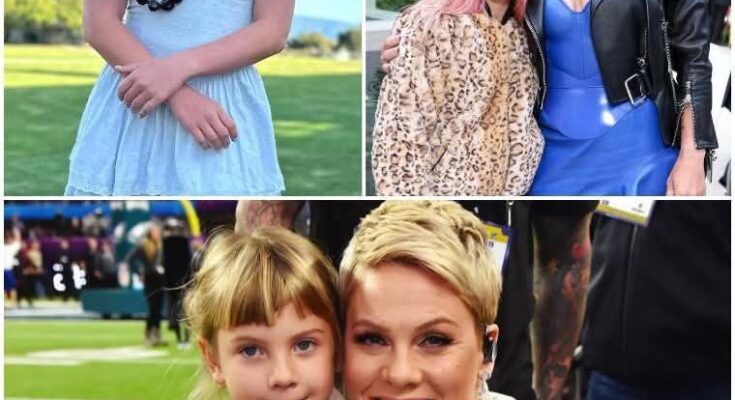Pink is defying gender standards at home, just as she does on stage, as seen by her strong decision to raise her daughter Willow in a “label-less” home. From accepting Willow’s wish to wed an African woman when she was six years old, to
Pink’s defiance of gender standards starts at home—in the way she raises her daughter, Willow. She intentionally creates what she calls a “label-less household.” This isn’t just a parenting philosophy—it’s a lived ethos, grounded in freedom, humor, and boundless love. When Willow, at six years old, announced calmly that she intended to marry an African woman, Pink responded with delight. She quipped, “Great, can you teach me how to make African food?”—to which Willow sweetly replied, “Sure, Mama. And we are going to live with you while our house is getting ready.” The exchange, as Pink recounted in conversation with The Sunday People, is playful and profound: rooted in acceptance, sprinkled with warmth, and utterly centered on the child’s agency
That anecdote reveals much of what makes Pink’s parenting extraordinary. It’s not that she imposes norms or pushes any agenda—she simply meets her child where she is. She responds with curiosity, humor, and openness. Her approach isn’t about instructing Willow how to behave; it’s about saying, “Tell me. Teach me. Show me who you are.” When Willow envisions a future partner, Pink doesn’t recoil or redirect; she leans in, inviting both connection and conversation.
Yet for Pink, “gender-neutral” is in itself too confining a term. She prefers “label-less,” as she explained in People’s Beautiful Issue. She resists even that descriptor, saying, “I feel like gender-neutral is in itself a label—and I’m label-less.”(Business Insider) For her, the goal isn’t to fit Willow and her brother Jameson into another box; it’s to keep the door open entirely. “It’s whatever floats your boat,” Pink emphasizes—meaning that every expression, every identity, every aspiration is valid. In her home, a girl can do anything, and a boy can do anything.(Business Insider)
Pink’s stories don’t just stop at witty parenting moments; they also reveal her deep dedication to emotional truth. At the 2017 VMAs, accepting the Michael Jackson Video Vanguard Award, she shared a deeply moving story about Willow. One morning, while driving to school, Willow said unprompted, “Mama… I’m the ugliest girl I know.” She felt like she looked like “a boy with long hair.” Pink was stunned—and she turned that moment into a gift. That night, she created a PowerPoint filled with images of artists who were androgynous or boldly themselves: Michael Jackson, David Bowie, Freddie Mercury, Annie Lennox, Janis Joplin, and more. She told Willow, “When people make fun of me… do you see me changing my body? …Changing my hair? No. Do you see me selling out arenas? Yes.” And then she added, “We don’t change. We take the gravel and the shell and make a pearl. That “pearl” image captures exactly what she’s instilling: strength, self-acceptance, and the refusal to shrink.
By crafting such moments, Pink reframes beauty and gender norms—not as mandates, but as mirrors for resilience. She shines a light on the power of individuality, of standing in your own truth even when the world doubts you.
This philosophy aligns Pink with a growing movement: parents choosing to raise children beyond gender stereotypes. A Parents magazine profile brings her together with other celebs like Zoe Saldaña, Beyoncé, Angelina Jolie, and Olivia Wilde—each forging pathways for their kids to live free of predefined roles In that company, Pink stands out for the radical simplicity of her label-less view.
Her commitment to her children’s freedom isn’t theoretical—it’s practical and creative. Willow doesn’t just accompany her on tour; she also earns her own money. Pink teaches her to negotiate, explaining wages and math not abstractly, but in real, loving terms: “it’s about $22.50 a show… she goes, ‘I’ll take $20, it’s easier math.’ I said, ‘That’s not how you negotiate for yourself.’”− “You’ll take $25 so it’s easier math. It’s a parenting moment and a lesson in confidence: teaching a young girl she has worth, and her voice matters.
Willow also shines on stage—singing, dancing, performing acrobatics. At nine, she landed on a Billboard chart as the youngest artist ever to appear, when she duetted with Pink on “Cover Me in Sunshine.”That song is a beautiful coda to this story—creative collaboration, mother and daughter side by side. It’s love made audible.
Taken together, Pink’s parenting decisions are more than rebellious gestures—they’re tender renunciations of limitations. She builds a home where identity isn’t imposed but explored, where conformity gives way to curiosity, and where every facet of being is allowed.
Here’s what makes the story of Pink and Willow—and label-less parenting—particularly resonant today:
Freedom through love. Pink’s narrative anchors parenting in unconditional acceptance. She doesn’t predefine love; she lets it unfold, guided by the child.Rejection of norms as liberation. Pink isn’t just opposing gender standards; she’s showing how individuality blooms when pressure dissolves.Empowerment by example. She doesn’t lecture Willow into empowerment—she embodies it: on stage, in her speeches, in her identity as both “mum” and powerhouse performer.Teaching resilience. Through PowerPoints and tours, Pink teaches Willow how to respond to criticism, evaluate worth, and stand with dignity.Humor as connection. Her comedic response—Willow’s future living situation and menu planning—is affectionately witty, building intimacy and laughter into learning.Real-life modeling. Pink’s public vulnerability—the VMA story, label-less reflections in People—gives other parents permission to be imperfect, optimistic, and courageous.
In an era of heated cultural debates about identity, Pink’s quiet revolution in her home is radical. It’s a revolution of normal. She doesn’t stage grand protests; instead, she asks questions, listens, and laughs. She teaches values not through dogma, but through trust.
Her parenting is an everyday act of defiance. She says the words out loud: “I don’t like labels.” Then she lives it. She affirms that Willow can choose who she loves, how she lives, and how she perceives herself.
This is what makes Pink’s story both tender and powerful. She’s not just raising a child—she’s raising a generation, one that might exceed expectations, one that might paint outside the lines, and one that knows its worth, whatever form it takes.
So here’s to about twenty-eight hundred words of reflection on Pink’s label-less parenting. A story of radical acceptance, everyday empowerment, and the beautiful ways a mother can teach a child—and remind us all—that identity should be a starting point, not a limit.



